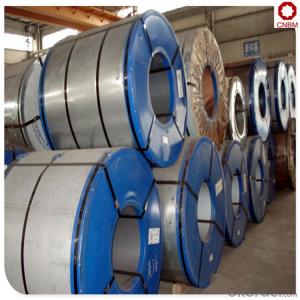Galvanized steel coil for roofing sheet Dx51d z100
- Loading Port:
- Tianjin
- Payment Terms:
- TT OR LC
- Min Order Qty:
- 25 m.t.
- Supply Capability:
- 35687 m.t./month
OKorder Service Pledge
OKorder Financial Service
You Might Also Like
Item specifice
Main Features of the Hot-Dip Galvanized Steel Sheet:
• Excellent process capability
• Smooth and flat surface
• Workability, durability
• Excellent anticorrosive property
• High strength
• Good formability
• Good visual effect
Standard and Grade :
Hot-dip galvanized steel coils | ||||
ASTM A653M-06a | EN10327:2004/ 10326:2004 | JISG 3302-2010 | AS-NZS 4534-2006 | |
Commercial quality | CS | DX51D+Z | SGCC | G1+Z |
Structure steel | SS GRADE 230 | S220GD+Z | SGC340 | G250+Z |
SS GRADE 255 | S250GD+Z | SGC400 | G330+Z | |
SS GRADE 275 | S280GD+Z | SGC440 | G350+Z | |
SS GRADE 340 | S320GD+Z | SGC490 | G450+Z | |
SS GRADE550 | S350GD+Z | SGC570 | G550+Z | |
S550GD+Z | G550+Z | |||
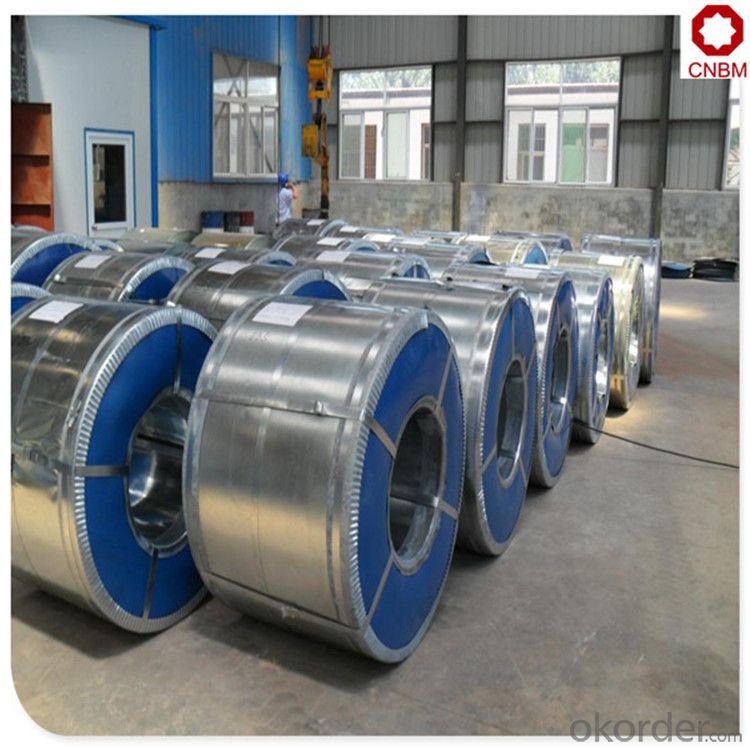
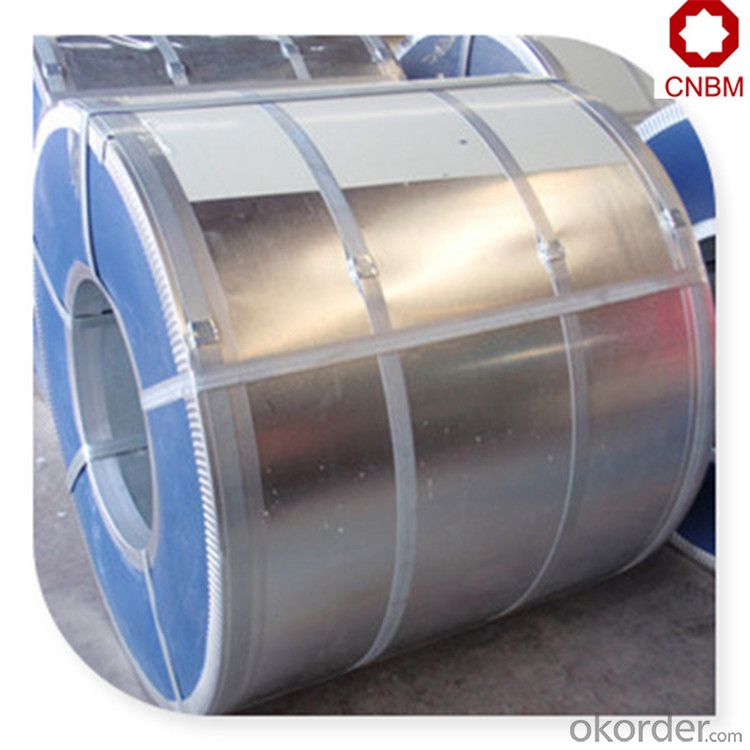
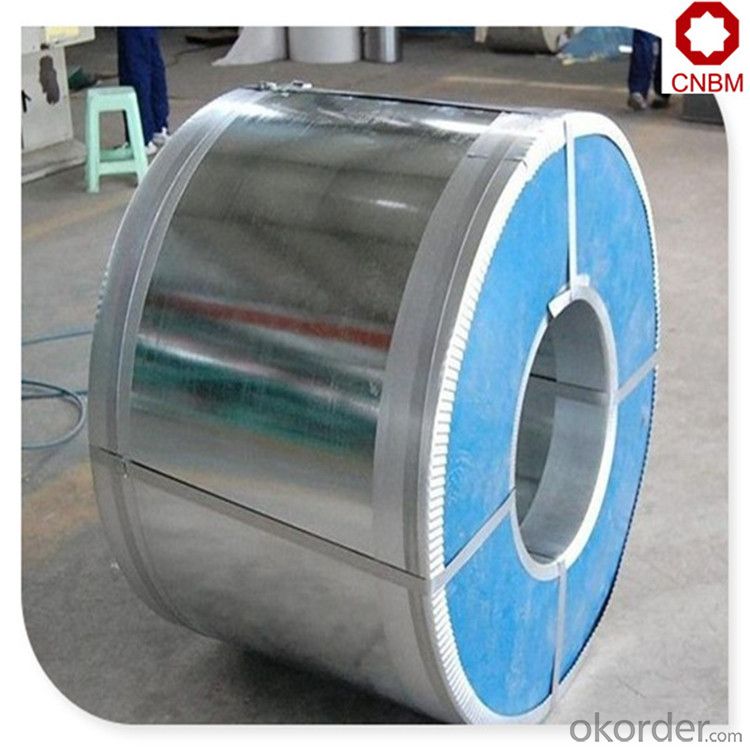
FAQ
Q: How do you guarantee the quality of your product?
A: Every process will be checked by responsible QC which insures every product's quality.
Q: How much is your delivery time?
A: Normally within 30 days of receipt of LC original or prepayment, but mostly according to the specific requirements or the quantity
Q: I need sample, could you support?
A: We can supply you with the sample for free, but the delivery charges will be covered by our customers. For avoiding the misunderstanding, it is appreciated if you can provide the International Express Account for Freight Collect. Also you can have a visit to us, welcome to CNBM!
Certificate:
CNBM International is highly recognized by its business partners and clients all over the world and has obtained rapid development under the spirit of win-win. We will carry on the mutual beneficial, innovative and revolutionary trading structure as we did before, create value for our employees, share holders and clients and benefit the whole society in our future development
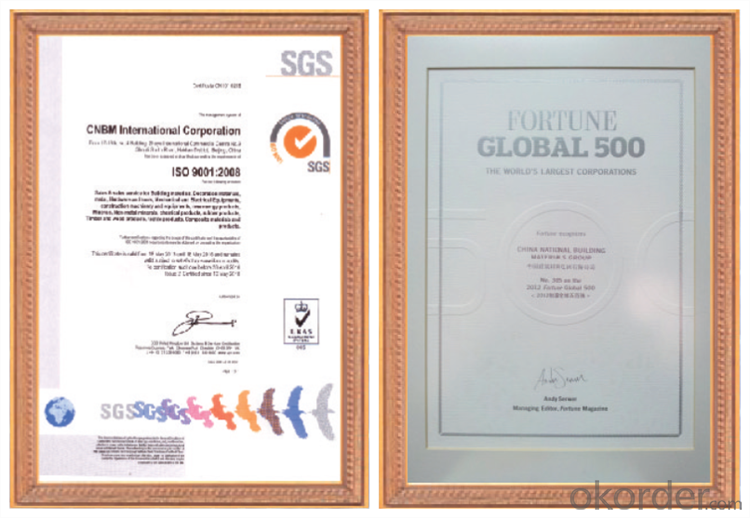
- Q:Can steel coils be coated with nickel?
- Yes, steel coils can be coated with nickel.
- Q:How are steel coils used in the production of marine vessels?
- Steel coils are used in the production of marine vessels primarily for their strength, durability, and corrosion resistance. These coils are shaped and formed into various components such as hulls, decks, and bulkheads, providing a sturdy framework for the entire vessel. By utilizing steel coils, marine vessels gain the necessary structural integrity to withstand harsh marine environments and ensure the safety and reliability of the vessels.
- Q:Can steel coils be coated with tin?
- Yes, steel coils can be coated with tin.
- Q:What is the role of steel coils in the construction industry?
- Steel coils play a crucial role in the construction industry as they are used for various purposes. They are primarily used in the fabrication of structural components such as beams, columns, and trusses, providing strength and stability to buildings. Steel coils are also utilized in the manufacturing of roofing and siding materials, reinforcing bars, and various mechanical components. Their versatility, durability, and resistance to corrosion make them an essential material in construction, ensuring the longevity and safety of structures.
- Q:What are the challenges in coil blanking for complex shapes?
- Coil blanking for complex shapes presents several challenges that need to be addressed in order to achieve accurate and efficient results. One significant challenge lies in the precise positioning and alignment of the coil material. Complex shapes often require intricate cutting patterns, and any misalignment or deviation can lead to inaccurate cuts and wasted material. Another challenge is the selection and optimization of the blanking tooling. Complex shapes often require specialized dies and punches, which need to be carefully designed and manufactured to ensure accuracy and consistency. This not only involves the selection of appropriate tooling materials but also the consideration of factors such as cutting forces, wear resistance, and tool life. The complexity of the shapes also poses challenges in terms of material deformation and springback. During the blanking process, the material undergoes various deformations and stresses, which can cause distortions and dimensional variations in the final product. Achieving the desired shape while minimizing these deformations requires a thorough understanding of material properties and advanced techniques such as compensation and adjustment in the die design. Furthermore, the high-speed nature of coil blanking for complex shapes can lead to increased vibration and noise levels. The dynamic forces involved in cutting intricate shapes can result in tool chatter and excessive noise, which not only affects the quality of the cut but also the overall operational efficiency. Implementing effective damping and vibration control measures, such as tool coatings and optimized cutting parameters, is crucial to mitigate these challenges. Lastly, the complexity of the shapes can also impact the overall production efficiency. Complex shapes often require longer tool setup times and more frequent tool changes, which can lead to increased downtime and reduced productivity. Additionally, the intricate nature of the cuts may require multiple passes or additional machining operations, further adding to the production time and complexity. To overcome these challenges, manufacturers need to invest in advanced technologies, such as computer-aided design and simulation software, to optimize the blanking process. Additionally, continuous research and development efforts focused on improving tooling materials, cutting techniques, and process control can help address the challenges associated with coil blanking for complex shapes.
- Q:Not sure if stainless steel is actually sealable but what's the best way to clean a brushed stainless steel appliance to not get so many finger prints...etc. I have stainless steel wipes that I used on another appliance and they don't work so great.
- Straight white vinegar on a clean white cloth does an amazing job on all my appliances. Makes the kitchen smell great to.
- Q:How are steel coils transported and stored?
- Steel coils are typically transported using flatbed trailers, coil carriers, or railcars. These coils are securely strapped or banded to prevent movement during transportation. Once they reach their destination, they are usually stored in warehouses or outdoor storage yards. The coils are stacked on top of each other, often with the help of specialized equipment, to optimize space utilization. They may also be stored horizontally on racks or stored vertically in specially designed coil racks. Proper handling and storage procedures are followed to ensure the safety of personnel and to prevent damage to the steel coils.
- Q:Can steel coils be coated with scratch-resistant materials?
- Yes, steel coils can be coated with scratch-resistant materials. These materials are designed to provide an additional layer of protection to the steel surface, minimizing the risk of scratches or damage during handling, transportation, or storage.
- Q:How is the thickness of a steel coil measured?
- The thickness of a steel coil is typically measured using a gauge, which is a specialized tool specifically designed for measuring the thickness of materials. The gauge is pressed against the coil, and the reading on the gauge indicates the thickness of the steel.
- Q:Can steel coils be coated with RFID technology?
- Yes, steel coils can be coated with RFID technology. The RFID tags can be securely attached to the surface of the steel coils, allowing for easy tracking, inventory management, and supply chain visibility.
1. Manufacturer Overview |
|
|---|---|
| Location | |
| Year Established | |
| Annual Output Value | |
| Main Markets | |
| Company Certifications | |
2. Manufacturer Certificates |
|
|---|---|
| a) Certification Name | |
| Range | |
| Reference | |
| Validity Period | |
3. Manufacturer Capability |
|
|---|---|
| a)Trade Capacity | |
| Nearest Port | |
| Export Percentage | |
| No.of Employees in Trade Department | |
| Language Spoken: | |
| b)Factory Information | |
| Factory Size: | |
| No. of Production Lines | |
| Contract Manufacturing | |
| Product Price Range | |
Send your message to us
Galvanized steel coil for roofing sheet Dx51d z100
- Loading Port:
- Tianjin
- Payment Terms:
- TT OR LC
- Min Order Qty:
- 25 m.t.
- Supply Capability:
- 35687 m.t./month
OKorder Service Pledge
OKorder Financial Service
Similar products
New products
Hot products
Related keywords
